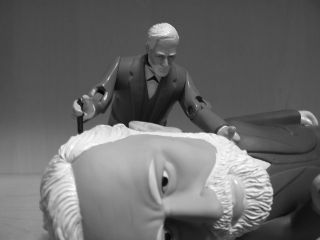Therapy
Get Motivated to Recharge Your Therapy
How to Put the Umphhh Back in Your Self Work
Posted July 31, 2014

Perhaps you are reading this, wondering if you are with the right therapist. Maybe you are reading this because you are debating whether or not to get back into therapy, or to enter therapy for the first time.
A big part of people’s resistance to therapy is the lack of knowing how to properly utilize one’s therapy sessions. Many people are under the impression that they are supposed to go in, lay down on a couch, and free associate, upon which the therapist gives a brilliant, all-encompassing, earth-shattering interpretation at the end of each session.
This might have been the way Freud imagined it, but today’s therapy often takes on a much different feel. There are many therapists today who still rely on a Freudian approach, or “blank-slate” method- where the patient free-associates and projects on to them. However, from the feedback I have received- many clients do not feel comfortable in this type of atmosphere. Moreover, they often feel that therapy becomes a waste of time, thinking they could just as easily talk to their bedroom wall and save a couple hundred bucks.
Most of today’s therapy takes on a more interactive role. The therapist’s goal is oftentimes to provide what is called a “corrective emotional experience” to the client, who may have endured a lifetime of maladaptive relationship patterns. I also believe it is the therapists job to act as part trainer/coach, eliciting from the client their goals, and ensuring that they are putting just as much work in the 6 days in between, as they are during their sessions.
I often use the analogy of when one starts a new exercise program at the gym. If you went in to your personal trainer and told them that you want to shed 7% body fat, and lose 15 lbs, but you only intend to go one day a week- they might look at you as if you were an alien.
That is the same principle in therapy. You can’t expect to implement long term change from a lifetime of doing things in an unhealthy way, by just coming in 1 day a week for therapy. You have to really make a conscious effort to put your therapy into practice in the six days in between.
Another question many individuals often have, who are already in therapy is "am I in the RIGHT therapy?" My answer is that if you leave feeling unsettled and a bit uncomfortable, then you are probably in the right therapy. If you always leave feeling good- you might just be getting a temporary $200/hour bandaid.
Once you get the idea of how therapy can truly elicit long term change in your life- you may be asking “what do I do in therapy?” Here are some of the top 10 ways you can best utilize your therapy sessions and get the most out of your time and money:

Invest in a journal that you will carry with you throughout the week and actually write your thoughts, feelings, and behaviors each day. You don’t have to write a lot, but just enough that it can give you an idea of what is relevant in your life before going into your session. Some clients also choose to just write their thoughts during the week down in a list in their smart phone.
Plan ahead. If your session is at 3 pm- plan for 2:45 in your schedule. Go a bit early, and while waiting, go through and review your journa/phone for the relevant points, or make an outline of the key points you’d like to address during session.
Carry a notepad, or write in your smartphone, points throughout the week that you want to talk about during therapy. For instance, if you go to a party and feel an incredible amount of anxiety when you talk to strangers- simply note that in your phone list, and bring up during the next session.
If you need a template for what to evaluate in your weekly activity, thoughts, and feelings. You can use the B.A.L.A.N.C.E model in my book to see what areas you would like to build upon during your therapy. For instance, if you realize that “N” = nurturing relationships, is suffering in your life. Maybe you expand upon this and bring into your session. In what ways are your relationships suffering (judgement, negativity, anxiety, substance abuse, etc)? Do you want more relationships? Do you have too many pseudo-relationships? Are you relationships lacking intimacy?
Become comfortable with silence. Therapy can be a microcosm for our outside world most of the time. However, where therapy differs is that it should allow for silence. Sometimes you may say something very powerful and meaningful. A good therapist will use the power of silence to allow that to sink in and to hopefully elicit further exploration. Allow yourself to be silent sometimes so that you can hear what is further beneath the surface.
Challenge your therapist. Therapists are humans too. We make mistakes. If your therapist makes an interpretation or re-states what you have said, and it doesn’t feel congruent with you- correct them.
Know your theories. It is likely that ,like people, not all therapists are going to be the right fit. Finding the right therapist for you is a bit like dating and it doesn't always just "click" on the first try. If you know a bit more about how you see human nature, you are more likely to pick the right fit with your therapist.
For instance, a psychodynamic therapist is more likely to encourage you to focus on your childhood, relational dynamics, and say “how does that make you feel” quite a bit. A solutions-focused therapist, is less likely to focus on childhood, and more likely to ask you to discuss the present and what behaviors you can do to elicit change. A cognitive behavioral therapist is going to focus more on your thought patterns and help you see how changing those thoughts can have a direct impact on your feelings.You can read more about the different types of therapies here.
Before scheduling an appt with a therapist- ask them a bit about their approach. Most therapists should have no problem talking to you atleast briefly about how they see human nature, pathology, and treatment.
A therapist should never monopolize the session with their own agendas. If you find that they are talking more about themselves than you- you are probably not with the right person. Read more about how to know if you are with the right therapist here.
Lastly, if you feel that you are not making the most of your sessions. Change it. Speak to your therapist about your concerns, and offer some suggestions as to what you would like to see change. Either they will meet you where you need to be met, or it may be time to find a new therapist ;)




